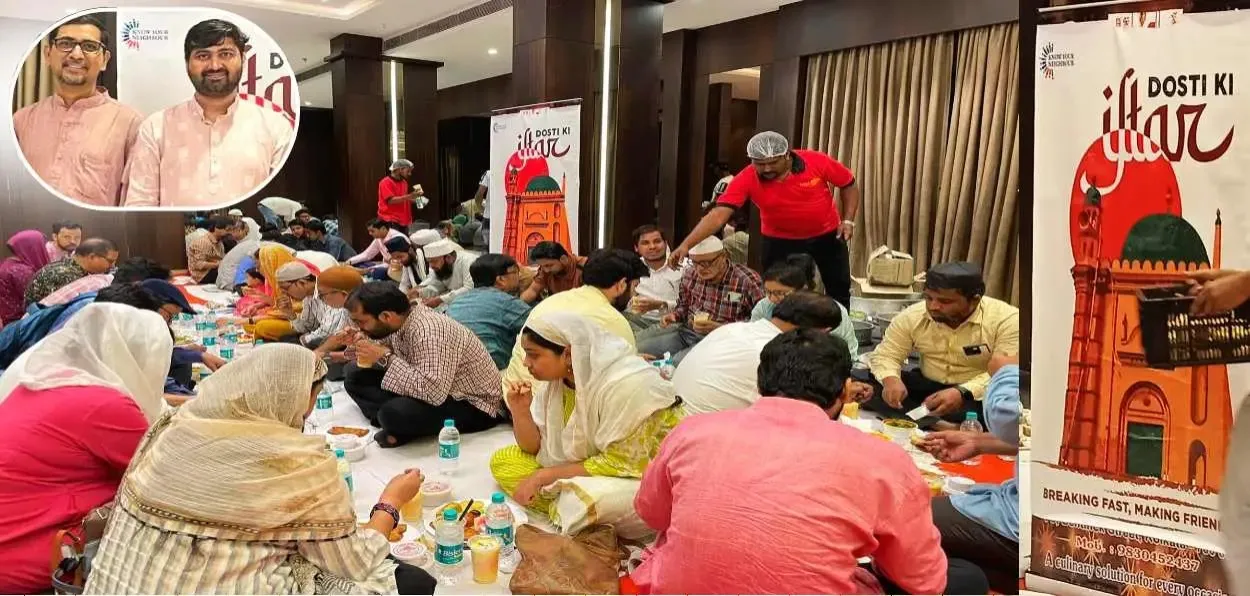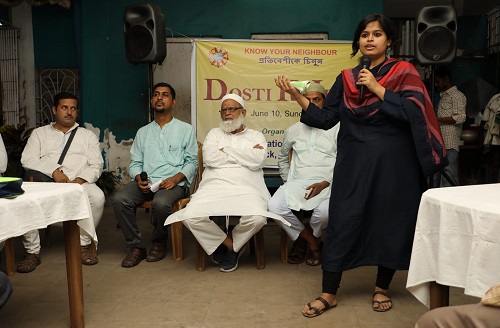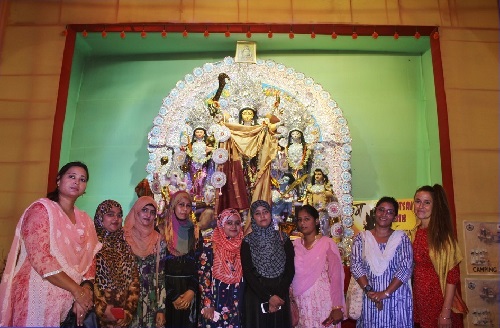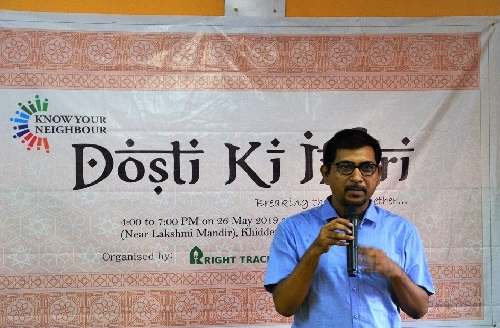
Mansooruddin Faridi/New Delhi
The City of Joy, Kolkata, is one of the richest cities in terms of cultural diversity and inclusive celebrations. Kolkata’s greatest strength is the communal harmony, religious values, and above all the zeal of its residents to protect their culture, tradition, and values.
One such social initiative 'Know Your Neighbourhood' (KYN) launched by the city’s youth promotes communal harmony and seeks to remove misunderstandings between communities has organised ‘Dosti Ki Iftar” for yet another time in which the fast-breaking evening meal for Muslims during the month of Ramzan is served to an inclusive gathering.
“We believe in the need for peaceful co-existence, not in the sense of living separately, but through actual interaction and relationships. In the light of the communal polarization of recent times, our objectives have become more important than ever,” KYN says on its website. Apart from organisaing events for others to understand Muslims, the KYN also take Muslims on heritage walks during the Hindus festivals like Durga Puja.
 A speaker at the Dosti ki iftar
A speaker at the Dosti ki iftar
Under the banner of KYN, a group of Hindu and Muslim youths stake non-Muslims on heritage walks in Muslim-dominated neighbourhoods twice a month. They would take people of other religions to these areas and show them the culture, history, and other aspects of the Muslims and this helps break the negative stereotypes. The initiative is meant to save Bengal from religious hatred and to make all communities feel good about each other.
The KYN also organises an annual event of the multi-faith Iftar called Dosti Ki Iftar where imorrtant figures such as intellectuals, professors, professionals, and journalists from non-Muslim communities were invited to break the bread with Muslims and also speak about issues that matter to all Indians.
The activists of KYN say that the Dosti Iftar is not only about meals, but also an idea exchange as eminent intellectuals invited to express their views on the country's situation and politics. All speakers highlighted the importance of national harmony and religious values at the recently organized Dosti Iftar.
The invited people speak about the political situation and issues of national importance were also spoken about. It turned out to be a pleasant experience for everyone. “Every year there are some guests for whom the experience of Iftar is the first such experience; they are very happy,” a volunteer said. It helped them feel good about Muslims and also remove misconceptions.
Heritage walk organised by KYN
Most of the guests said the Dosti ki iftar is a beautiful initiative. The best way to counter the misleading propaganda on social media is to invite people of other religions and allow them to see the culture and religious values of Muslims.
Dosti Iftars are usually attended by more than a hundred people, most of whom are non-Muslims. They come from different colleges and institutes. One of its advantages is that they carry the message of love, which helps in spreading the message of love, peaceful co-existence, and cultural multiculturalism.
This time, the non-Muslim guests spoke about Islamophobia. The two-hour conversation was attended by Prof. Amjad Hussain, Imran Zaki, Prof. Qazi Sufiur Rahman, Prof. Saifullah, Manzar Jameel, Noorul Haq IAS (Retd.), Nooruddin Sahib, Seemanti Ghosh, Aishwarya Biswas, Garima Dhabhai, Upal Chakraborty, Sumita Biswas, Prof. Abhijit Roy. , Ishita De and several other academicians, researchers and other civil society activists.
 The KYN activists at a Durga Puja Pandal
The KYN activists at a Durga Puja Pandal
Sabir Ahmed, one of the main promoters of this initiative, says that the religious polarization that has happened in the last decade it has made us aware that the propaganda against minorities has to be countered or we will face the consequences.
This prompted a group of Muslims and Hindus to launch the Know Your Neighbor initiative.
Sabir Ahmad told Awaz-the Voice that he realized that even those non-Muslims who had been living in Kolkata for a long period were not aware of Zakaria Street. “If you don’t know about your neighbourhood then how do you expct them to know about another religion or sect.”
In this situation, one can fall victim to propaganda -, heritage walks are nothing new, but we call them neighborhood walks because the idea is not only to find places of historical value and monuments but also to explore these neighborhoods is about knowing and understanding
Sabir Ahmed adds that actually when the name of Zakaria Street or Kullu Tola Street comes up, people only talk about Haleem or Falode. “We are all limited to food and drink only. We talked beyond this concept. The first neighborhood walk was organized in the Zakaria Street Kolotola area. They were informed about the heritage and history of the area - including non-Muslim women who visited the Nakhda Masjid for the first time.”
Muhammad Riaz, assistant professor at Alia University, Kolkata, and joint convenor of Know Your Neighbour, said that the main factor for this initiative was the growing religious polarization and prejudice against Muslims.
The KYN Group
“At the interfaith iftar gathering, we spoke about how to deal with a hateful environment, how to eliminate it or how to prevent it from escalating - these important questions were discussed first, in which more than 150 scholars, authors, academics, educators, researchers, former bureaucrats, social workers, and civil society members came over.
The event was jointly organized by the Minority Council of Bengal and Know Your Neighbour.
To promote interfaith dialogue and social harmony it organizes several events throughout the year. It includes neighborhood walks, talks, and other such activities. This walk gives you an experience of the rich and diverse history and culture of Kolkata that many people need time to be exposed to. Since its inception, the campaign has attracted the attention of many civil society activists and academics. Among them are Nobel laureate and economist Amartya Sen, poet Shankha Ghosh, writer and social activist Joya Mitra, and professor Sugata Bose.
A group had visited PM Basti in Howrah near Shibpur police station in the same month under the guise of a neighbour. When the group entered the streets of Shibpur, they saw that there were tables and chairs on which iftar was served. Dates, watermelons, haleem, etc. were served. Importantly, from small boys to elderly men and women participated.
 A speaker at the Dosti ki Iftar organised by the KYN
A speaker at the Dosti ki Iftar organised by the KYN
One such group reached the Nakhod Mosque along Zakaria Street. Group leader Junaid told the students about the history, architecture, and other features of the mosque. An Iftar was organized for all. The group tasted the famous Adam's Kebab of Kolotola and Haji Alauddin's Halwa. Enjoyed Haleem, Biryani, and Firni at Islamia Hotel.
The group also visited the Muhammad Ali Library named after Tehreek-e-Khilafat leader Maulana Muhammad Ali Johar at Kunai Shell Street near Zakaria Street, which has a priceless treasure of books. Urdu translations of Ramayana and Mahabharata along with Urdu books, documents, and newspapers make this library the center of attention.
Groups of non-Muslim intellectuals and students visit different areas under Know Your Neighbor
Mohammad Riaz says that everyone in this joint initiative is working with his heart and soul. “it is having a very positive effect. Those who are participating in Dosti Iftar and Know Your Neighbor are very happy. They ask questions about the lifestyle and culture of Muslims. If someone experiences Iftar for the first time, someone has stepped into a mosque for the first time.”
ALSO READ: How Darjeeling became home for this Kashmiri family
He said that this initiative has helped remove misunderstandings regarding Muslims. “Distances have disappeared and a connection is established,” he says.
